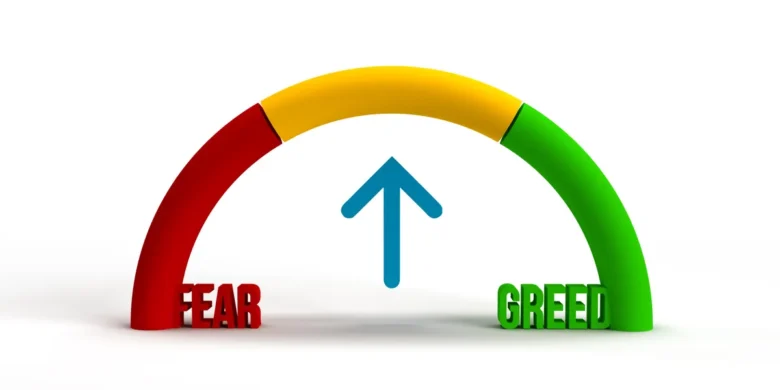The stock market may seem like a world of numbers, charts, and facts, but at its core, it’s driven by something difficult to predict: how people feel. Fear and greed are two of the most powerful emotions that influence investors. People often make decisions to buy, sell, or hold assets based on fear and greed, even though these emotions may seem irrational. When markets are rising, investors are driven by greed, and they chase profits. When the market collapses, their fear compels them to seek refuge elsewhere.
But decisions made based on gut feeling rather than strategy can go wrong. Understanding how fear and greed work in the market can give you a huge advantage. It’s not about getting rid of your feelings; it’s about being aware of them, managing them, and making better choices even when they’re present. Let’s talk about how these feelings can affect your investments and what you can do to stay in control.
How Fear Affects Investing:
Fear is a normal response to uncertainty about what’s going to happen and the possibility of losing something. When markets are down or there is troubling news in the investment world, people often feel fear. That’s the feeling you get when you realize that your portfolio is losing money. Some fear is beneficial because it prevents people from taking too many risks. But too much worry can cause people to panic and sell. Investors driven by fear sometimes exit the market at the worst possible time, losing money and missing out on a chance to recover.
Fear dominated investment behavior during the 2008 financial crisis and the coronavirus-induced market downturns in 2020. Those who stay calm and stick with their investments often make giant profits. To deal with fear, you need to step back, take a deep breath, and think about what you want to achieve in the long term. What you need to realize is that short-term downturns are a normal part of life, and fear is never a beneficial way to invest.
The Power of Greed in the Market:
Fear and greed are intertwined emotions. Greed is the emotion that arises when you see yourself getting more and more assets and want more. When people are greedy, they often can’t think clearly. When investors follow trends without understanding the fundamentals, they load their portfolios with risky assets or ignore warning signs because “everyone else is doing it.” This feeling is especially bad during a bull market, when everything seems certain.
The dot-com bubble and the rise of cryptocurrencies show how greed can lead to outsized prices. It’s easy to think that the good times will never end, but history shows that they do. When you’re greedy, it’s easier to ignore risk and make bad decisions. What’s the cure? Self-control. Make a plan for when to take profits, restructure your portfolio regularly, and remember that steady growth is better than fast, strong growth.
The Stock Market Sentiment Cycle:
Stock markets and investor sentiment rise and fall in cycles. The cycle often starts with hope, then moves to excitement and happiness (fueled by greed), and ends in fear, anxiety, and despair. Once you reach your lowest point, the recovery process starts with hope, progresses to relief, and ultimately culminates in renewed optimism. It is helpful to be aware of your emotional state throughout your cycle. Are you trying to get rewards because you are afraid of missing out? Or do you have concerns about getting involved? Understanding your feelings can help you avoid the common mistake of buying high and selling low. This cycle repeats itself over and over again. Knowing the truth can help you step back and make decisions based on strategy rather than emotion.
Fear and Greed Index: A Market Sentiment Tool
The Fear and Greed Index is one of the most widely followed indicators of market sentiment. CNN developed this tool to see if investors are fearful or greedy. The focus is on seven different indicators, such as market volatility, price momentum, and demand for safe assets. When the index causes a lot of panic, it usually means that now is a good time to buy because prices may be too low. On the other hand, overwhelming greed could mean that a correction is coming. The Fear & Greed Index is a good way to keep an eye on market sentiment, but it should not be the only indicator that determines your entire investment plan. It reminds investors that it is not just fundamentals but also psychology that can change prices and create new opportunities.
How to Keep Your Mind Clear in the Middle of Emotional Chaos:
Being rational in the stock market is easier said than done. But the most important thing is to have a solid investment plan and stick to it. Please be aware of your risk tolerance, ensure your investments are diversified, and establish clear investment goals. These steps can provide you with a solid foundation to return to when your emotions become uncontrollable. Don’t review your portfolio every day; short-term changes can make you feel uneasy.
Please ensure you review your investments regularly. When the market goes down, think about how it has recovered in the past. When it comes up, ask yourself if your excitement is making it difficult to think clearly. Seek independent voices in your community, such as mentors, advisors, and even financial groups, who can help you stay grounded. Rational investing doesn’t mean being emotionless; it means knowing what they are and not letting them dictate your choices.
The Risks of Following Your Instincts:
Adapting to market fluctuations is a significant obstacle to successful investing. When panic sets in, people sell. They buy things when they’re excited. Such emotional herd behavior leads to bubbles and crashes. Just because everyone else is doing something doesn’t mean it’s right for you. The best investors often do the opposite of what everyone else is doing: they buy when everyone else is selling, and they sell when everyone else is buying. To achieve this, you have to be brave, disciplined, and have a clear idea of what you want to do with your money. Don’t give in to the urge to follow trends or panic. Short-term sentiment drives the market, while long-term value drives it. Trust your studies and strategy, and accept being alone if it means making the best choices for your future.
Conclusion:
Fear and greed are constantly at war in the stock market. These intense emotions can lead people to buy, sell, or hold their investments at the wrong time. Such feelings can lead to bad decisions. But understanding how these emotions work can be to your advantage. Understanding when fear is causing you to sell too quickly or when greed is causing you to take risks can help you regain control. When investing, it’s important to be emotionally intelligent, but it’s also important to be unemotional. Stick to your strategy, learn as much as you can, and remember that making smart, consistent choices will lead to long-term success. Sentiment can cause the market to swing dramatically, but your plans don’t have to. When investing, you should let your feelings guide you, not your own.
FAQs:
1. What is the Fear and Greed Index? How does it help investors?
We use many indicators to understand people’s feelings about the market. Investors can use these indicators to determine whether fear or greed drives the market. This knowledge can help them make better decisions about when to buy and sell.
2. What can I do to prevent fear from harming my investments?
Don’t let short-term market noise affect your decision-making. Instead, stick to a long-term plan and diversify your investments across different asset classes. It is indeed important to keep your emotions in check.
3. Why is greed bad for investing?
Greed can make you overconfident, leading you to take risky bets and ride market bubbles. Such optimism often causes people to ignore the signs that something is wrong.
4. Shouldn’t your emotions get in the way of your investments?
No, it’s okay to have feelings, but you have to deal with them. Don’t let them control your thinking; use them to help you think.
5. Can you make money investing in relationships?
Sometimes, making judgments based on feelings can pay off in the short term, but in the long run, logic, preparation, and strategy will always win out.




